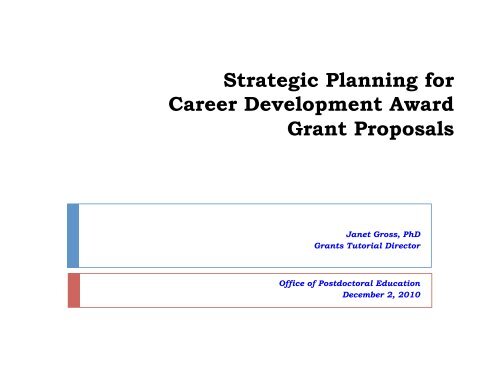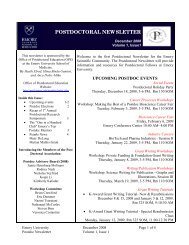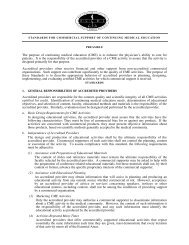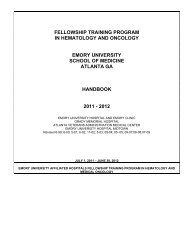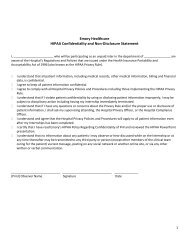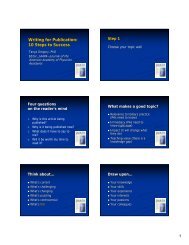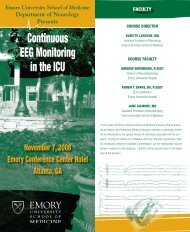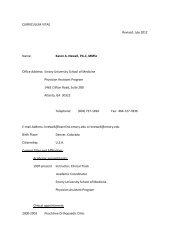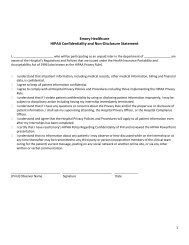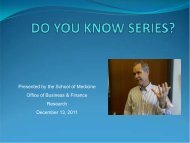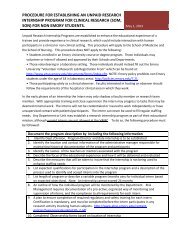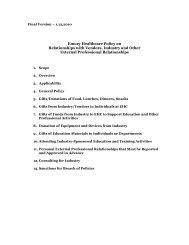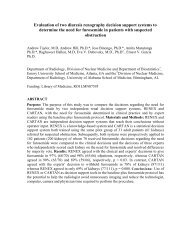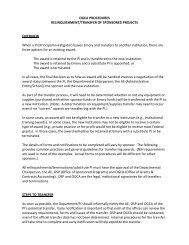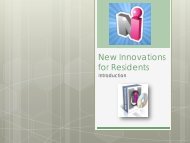Strategic Planning for Career Development Award Grant Proposals
Strategic Planning for Career Development Award Grant Proposals
Strategic Planning for Career Development Award Grant Proposals
Create successful ePaper yourself
Turn your PDF publications into a flip-book with our unique Google optimized e-Paper software.
<strong>Strategic</strong> <strong>Planning</strong> <strong>for</strong><br />
<strong>Career</strong> <strong>Development</strong> <strong>Award</strong><br />
<strong>Grant</strong> <strong>Proposals</strong><br />
Janet Gross, PhD<br />
<strong>Grant</strong>s Tutorial Director<br />
Office of Postdoctoral Education<br />
December 2, 2010
Objectives<br />
1. What is a <strong>Career</strong> <strong>Development</strong> <strong>Award</strong>?<br />
2. Should I write a CDA – personal and professional<br />
issues?<br />
3. Overview of the NIH K-series CDA<br />
4. Preparing a CDA application using the K award as a<br />
model<br />
5. Learn about a NIH reviewer’s experience<br />
6. Learn about a candidate’s experience
Panel Presentation<br />
Janet Gross, PhD – grants specialist<br />
James Zimring, MD, PhD – Reviewer <strong>for</strong> NIH K <strong>Award</strong>s; Associate<br />
Professor, Department of Pathology & Laboratory Medicine<br />
<br />
<br />
What is involved in a mentoring plan <strong>for</strong> a CDA grant<br />
Reviewing the K grants<br />
Wendy Hassenkamp, PhD – NIH K99/R00 applicant Oct 2010;<br />
Postdoctoral fellow in Emory’s Scholars Program in Interdisciplinary<br />
Neuroscience Research; Departments of Psychology and Psychiatry<br />
<br />
<br />
Experiences in writing the K99<br />
Communicating with the NIH be<strong>for</strong>e submitting the proposal
Goal of a <strong>Career</strong> <strong>Development</strong> <strong>Award</strong><br />
<br />
<br />
<br />
Preparation to transition to independence as a<br />
biomedical, public health and/or health sciences<br />
researcher<br />
Mentored vs. non-mentored<br />
Academic career stepping stone
You must excel in <strong>Grant</strong> Writing<br />
Excellent research idea + excellent mentoring team<br />
Careful attention to detail – research, training, writing<br />
Salesmanship - persuasive writing<br />
Beautiful presentation – don’t tax the reader<br />
Can be tedious, boring, frustrating<br />
Like filing taxes, mistakes are costly
Issues in considering a CDA:<br />
• Personal<br />
• Professional<br />
• General
1. Eligibility – Yes or No?<br />
• Citizenship<br />
<br />
of the NIH K awards, only the K99/R00 allows <strong>for</strong> non-citizens<br />
• Academic degree, experience<br />
<br />
NIH K awards are <strong>for</strong> basic scientists (K01, K99), clinicians (K23),<br />
engineers (K25), etc.<br />
• Years post degree or post training<br />
<br />
Some K awards have 5 year Postdoc rule – check carefully<br />
• Academic rank or job title<br />
<br />
<br />
Postdoctoral fellow vs. faculty position<br />
Tenure track or not (each institute has its rules)
2. Assess Your Competitiveness<br />
• Publication record<br />
<br />
<br />
>1 first author publication, preferably experimental research, in<br />
your current field, related to the aims of the K<br />
Published with your mentor(s)<br />
• Biosketch that shouts “I’m on the career path to<br />
becoming a (NIH) funded independent investigator”<br />
<br />
<br />
Personal Statement states this explicitly<br />
Track record is the evidence<br />
• Other professional activities - awards, invited<br />
presentations, co-I, association memberships, etc.
3. Seek Advice and Guidance<br />
• Mentoring is key in a CDA<br />
<br />
<br />
<br />
Who is promoting you and your career?<br />
Mentoring vs. pseudo-mentoring<br />
Who will help you determine if this is the right time <strong>for</strong> a CDA and<br />
help you develop the Candidate Plan and Research Plan<br />
• Do you have Departmental support <strong>for</strong> resources as well as<br />
the balance of funds needed - salary, materials<br />
• Who needs to know that you are submitting a grant?
4. Research Ideas Research Plan<br />
• A mentored CDA requires training in an area where you<br />
are currently not a recognized expert<br />
NEW laboratory methods, analytical methods, modeling schemes,<br />
<br />
comparative systems, new animal models, etc.<br />
Coursework<br />
• Can’t be ‘business as usual’; not an extended postdoc; not<br />
funding <strong>for</strong> your PI to support a postdoc<br />
• Hypothesis-driven work is highly valued<br />
• If you are already an expert in what you are proposing, you<br />
won’t fulfill the criteria of a CDA.<br />
Branch out in a new exciting direction
5. Know Your Departmental Procedures<br />
<br />
Get permission from your department to submit grant a<br />
proposals<br />
Non-NIH (0-8%) ≠ NIH rates (8%)<br />
<br />
<br />
<br />
Is your department ready to support you as an independent<br />
researcher?<br />
Promotion issues - postdoc vs. faculty<br />
Tenure track issues (with the funder and the department)
6. Contact the Funder<br />
Have you contacted the appropriate NIH I/C?<br />
• Confirm your eligibility<br />
Years experience, citizenship, etc.<br />
• Have you received verbal or written feedback about your<br />
research ideas?<br />
• Are your research ideas and training plans responsive to<br />
the goals and mission of the funding agency?<br />
• Each PA has a Table of Institute and<br />
Center Contacts
7. <strong>Grant</strong>maker’s (i.e., Funder) Attitude ≠<br />
<strong>Grant</strong> Writer’s Attitude<br />
Funders are in the business of giving grants<br />
Best possible portfolio of funded research<br />
Share credit <strong>for</strong> discoveries, treatments, outcomes<br />
Cultivate you as an advisory, researcher, reviewer, etc.
Overview of the NIH <br />
<strong>Career</strong> <strong>Development</strong><br />
<strong>Award</strong><br />
K-series
Purpose of the NIH K CDA<br />
<br />
<br />
To provide the “core resources and protected time” to<br />
develop independent research programs (>75% protected<br />
time)<br />
Typically 3-5 years, salary support plus research funds (all<br />
funds vary by NIH institute/center and award)<br />
Expected Outcomes within 3-5 years:<br />
− Preliminary data, presentations, peer-reviewed publications<br />
− RO1 (or similar) grant submission<br />
− Other research-based awards<br />
− <strong>Career</strong> in (academic) research
Which K is <strong>for</strong> me?<br />
K Kiosk - One Stop Shop <strong>for</strong> NIH CDAs<br />
http://grants.nih.gov/training/careerdevelopmentawards.htm<br />
Program Announcements (PA) and FOA<br />
Special interest funding = Request <strong>for</strong> Applications (RFAs)<br />
Funding in<strong>for</strong>mation, due dates, link to instructions, etc.<br />
Success Rates
Program Announcements (PA)<br />
There is a specific Parent PA <strong>for</strong> each K award<br />
Mentored Research Scientist <strong>Development</strong> <strong>Award</strong> (Parent K01)<br />
http://grants2.nih.gov/grants/guide/pa-files/PA-10-056.html<br />
NIH Pathway to Independence <strong>Award</strong> (Parent K99/R00)<br />
http://grants2.nih.gov/grants/guide/pa-files/PA-10-063.html
Mentored<br />
Postdoc<br />
Only<br />
Postdoc or<br />
Faculty<br />
Who is this <strong>for</strong>?<br />
K99/R00 * • biomedical, behavioral, or clinical sciences<br />
• mentored + independent<br />
• no citizenship requirement<br />
K01 * biomedical, behavioral, or clinical sciences<br />
K08 * clinical degree<br />
K23 * clinical degree<br />
K25 * quantitative/engineering background<br />
Other<br />
K02 Faculty only • newly independent scientist<br />
• salary only<br />
K07 * special criteria<br />
K22 * <strong>Career</strong> Transition <strong>Award</strong>
<strong>Career</strong> Path <strong>for</strong> a K25 –<br />
Mentored Quantitative Research <strong>Career</strong> <strong>Development</strong> <strong>Award</strong><br />
Training to date<br />
• PhD electrical &<br />
computer engineering<br />
• Postdoc neurology/<br />
neuroscience<br />
Mentored CDA<br />
5 yr K - neurology,<br />
neuroscience,<br />
advanced<br />
computational<br />
systems<br />
Independent<br />
academic<br />
researcher<br />
in computational<br />
intelligence in<br />
biomedical<br />
science
<strong>Career</strong> Path <strong>for</strong> a K01-<br />
Mentored Research Scientist <strong>Career</strong> <strong>Development</strong> <strong>Award</strong><br />
Training to date<br />
• PhD biochemistry<br />
• Postdoc immunology<br />
• CCFA research fellowship<br />
Mentored CDA<br />
Independent<br />
academic<br />
researcher<br />
in complex diseases<br />
of the immune<br />
system focusing on<br />
the intestine<br />
5 yr K:<br />
adaptive immunology<br />
T cell biology
Citizenship Recap<br />
No Citizenship Restrictions<br />
NIH K99/00<br />
Many non-NIH CDAs, Young Investigator <strong>Award</strong>s,<br />
Fellowships<br />
NIH R21* Exploratory/developmental award <br />
NIH R03* small grant program<br />
* R level grants are <strong>for</strong> faculty equivalent positions
Success rates <strong>for</strong> K grants at the NIH I/C<br />
NIH Publications on funded K’s, success rates, trends, etc.<br />
The Research Work<strong>for</strong>ce > Trends in Research <strong>Career</strong> <strong>Development</strong><br />
(K) <strong>Award</strong>s<br />
http://report.nih.gov/nihdatabook/Default.aspx?catid=16<br />
Be realistic about your chances<br />
At some I/C’s resubmission funding rates are > 50%<br />
http://www.report.nih.gov/success_rates/index.aspx
Research <strong>Career</strong> <strong>Development</strong> <strong>Award</strong>s <br />
Number of entry-‐level awards <br />
NIH Extramural Data Book – last update May 2008<br />
Data provided by the Division of In<strong>for</strong>mation Services, Reporting Branch
If at first you don’t succeed ....<br />
RESUBMIT
<strong>Grant</strong> Writing <strong>for</strong> a<br />
CDA<br />
Using the NIH K<br />
<strong>Award</strong> as a Model
<strong>Grant</strong> Writing 101<br />
Review a funded proposal - do not be naïve<br />
Contact the funder - is your science fundable?<br />
Coaching - have a plan, have a partner<br />
<strong>Strategic</strong> plan <strong>for</strong> your proposal - what is yours?<br />
Timeline - time allocation & priorities<br />
Confidence in your plan - convey your enthusiasm<br />
“Arm’s Length” approach to reading your own work - leave plenty<br />
of time <strong>for</strong> editing, rewriting & rewriting<br />
Ask others to read and critique your work
Mechanics<br />
Finding the K package<br />
Decoding the details<br />
K Kiosk Program Announcement guidelines:<br />
http://grants.nih.gov/training/careerdevelopmentawards.htm<br />
SF424 (R&R) Application and Electronic Submission In<strong>for</strong>mation:<br />
http://grants.nih.gov/grants/funding/424/index.htm
Follow All Directions!<br />
<br />
<br />
You must follow the very specific, idiosyncratic directions you are given<br />
Guidelines may present a challenge - worth reading > 3 times - (Read All of<br />
Me - long and boring but if you don’t, you’ll make lots of mistakes)<br />
Be very careful in the Special K section (Section 7).<br />
<br />
There may appear to be inconsistencies, conflicts, etc.<br />
<br />
<br />
Call funder <strong>for</strong> clarification!!! There is no stupid question.<br />
Mistakes in written guidelines can happen.
K REVIEW CRITERIA<br />
MOST IMPORTANT<br />
- all must be at least EXCELLENT to receive funding<br />
- any one of these with a fatal flaw will result in NO SCORE<br />
1. Candidate<br />
2. <strong>Career</strong> <strong>Development</strong> Plan - <strong>Career</strong> Goals & Objectives, Plan<br />
to Provide Mentoring<br />
3. Research Plan<br />
4. Mentors, Co-mentors, Consultants & Collaborators<br />
5. Environment and Institutional Commitment to the Candidate
Within 12<br />
page limit<br />
Within 12<br />
page limit
Required narrative sections <strong>for</strong> the K<br />
(goes in PHS398 page)<br />
Introduction<br />
1. Introduction to resubmission (1 page max.)<br />
Candidate In<strong>for</strong>mation (within 12 page limit)<br />
2. Candidate’s Background<br />
3. <strong>Career</strong> Goals and Objectives<br />
4. <strong>Career</strong> <strong>Development</strong>/Training Activities During the <strong>Award</strong> Period<br />
5. Training in the Responsible Conduct of Research<br />
6. Mentoring Plan (n/a <strong>for</strong> K01, K08, K23, K25, K99)<br />
Statements of Support (6 page limit)<br />
7. Statements by mentor, co-mentor, consultants, contributors<br />
Environment and Institutional Commitment to Candidate (see page limits)<br />
8. Description of Institutional Environment<br />
9. Institutional Commitment to Candidate’s Research <strong>Career</strong> <strong>Development</strong><br />
Research Plan<br />
10. Specific Aims (1 page max.)<br />
11. Research Strategy (new <strong>for</strong>mat; within 12 page limit)
Suggestions <strong>for</strong> writing:<br />
Candidate In<strong>for</strong>mation<br />
<br />
<br />
<br />
<br />
<br />
<br />
“Speak” to the reviewer - not written in manuscript or research plan style<br />
First person is ok but don’t be “folksy” or “chatty”<br />
Reflect on your personal experiences as a scientist and where this award<br />
will take you<br />
Place to show passion <strong>for</strong> your research and your career<br />
Make a case <strong>for</strong> your personal career path - describe your contribution to<br />
the field and your anticipated contributions<br />
Strike a balance between confidence and enthusiasm<br />
Build a case <strong>for</strong> your career development with substance (enthusiasm +<br />
research plan + mentoring team + zeal <strong>for</strong> future discovery) and not just<br />
past credentials
Timeline
<strong>Career</strong> <strong>Development</strong> Timeline<br />
TRAINING OR PROJECT COMPONENT<br />
K99 – Mentored<br />
ORIGINAL RESEARCH<br />
R00 - Independent<br />
Year 1 Year 2 Year 3 Year 4 Year 5<br />
Specific Aim 1: Activatable nanoparticles XXXX XX<br />
Specific Aim 2: Miniaturized and flexible spectral device XX XXXX XX<br />
Specific Aim 3: Spectral device integration with endoscopy XXXX XXXX XX<br />
Specific Aim 4: Endoscopy in large animals XX XXXX<br />
MENTORING PLAN<br />
Group and Individual Meetings: Nie, S. Singhal, S. XXXX XXXX<br />
Surgical Shadowing and Consultation: S. Singhal XX XX<br />
Nanotechnology Training: S. Nie, L. Yang XXXX XXXX<br />
Photonics, Instrumentation Training: S. Nie,<br />
K. Carron, M. Russell<br />
XX XXXX<br />
PROFESSIONAL MEETINGS<br />
NCI Alliance in Nanotechnology XXXX XXXX XXXX XXXX XXXX<br />
American College of Surgeons XXXX XXXX XXXX XXXX XXXX<br />
American Association <strong>for</strong> Cancer Research XXXX XXXX XXXX XXXX XXXX<br />
MANUSCRIPT PREPARATION<br />
Anal. Chem., PNAS, JACS XXXX XXXX XXXX XXXX XXXX<br />
GRANT PROPOSAL PREPARATION<br />
Foundation – ACS, Komen, Avon XX XXXX XX<br />
R21 – Pilot grants; expand cancer types XXXX XX<br />
RO1 – New probes, grants with collaborators XXXX XXXX
Figure 2. K23 overall timeline <strong>for</strong> the training and research plan.
7. Statements by mentor, co-mentor,<br />
consultants, contributors<br />
Overall Objective: How the award will enhance the development of the<br />
candidate’s research career – this defines the CDA. You cannot be<br />
funded if you have a lukewarm Mentor’s section.<br />
Key Points:<br />
1. Nature and extent of supervision - how will the mentor oversee, guide,<br />
supervise your research and your career development<br />
2. Source and support <strong>for</strong> mentor’s research and other activities (mentor<br />
must have ongoing support <strong>for</strong> research – preferably NIH grants – <strong>for</strong> the<br />
duration of your K)<br />
3. Mentor’s commitment to candidate’s development<br />
4. Candidate’s teaching load, other responsibilities<br />
5. Mentor’s previous experience as a mentor
8. Description of the Institutional<br />
Environment<br />
• Must complement Facilities and Other Resources (4.4.9) and<br />
your career goals<br />
• Identify key personnel and resources available to you to per<strong>for</strong>m<br />
your research and develop your career particularly outside your<br />
lab<br />
• Mention other Core support, CDC, RSPH, SOM, Yerkes, Vaccine<br />
Center, etc.<br />
• Show the richness of the environment<br />
• There will be redundancy across sections and this is ok<br />
• This does not need to be particularly creative – see other grants
9. Institutional Commitment to the Candidate’s<br />
Research <strong>Career</strong> <strong>Development</strong><br />
VERY IMPORTANT<br />
i. Introduction - Ask your department <strong>for</strong> an example of this section<br />
<br />
<br />
Documentation (on letterhead) of the department’s commitment of resources<br />
and development of candidate independent of the receipt of the CDA<br />
A minimum of 75% of the candidate’s time will be protected and devoted to research<br />
outlined in this career development award proposal - DO NOT OMIT THIS<br />
ii. Agreement - Check <strong>for</strong> all elements of agreement outlined in sub a,<br />
b, and c.<br />
iii.<br />
Signatures
Research Plan<br />
10. Specific Aims – limited to 1 page, not part of 12<br />
11. Research Strategy – within 12 page limit<br />
a) Significance<br />
b) Innovation<br />
c) Approach<br />
Bibliography and References Cited get uploaded at<br />
4.4 Other Project Info Component
Resource <strong>for</strong> writing the Specific Aims<br />
section of the Research Strategy<br />
http://www.grantcentral.com/<br />
Free instructions pdf <strong>for</strong>:<br />
SPECIFIC AIMS SECTION: CREATE A BULLET OUTLINE
COMMON MISTAKES<br />
<br />
Scope of the Research Plan<br />
<br />
<br />
Overly ambitious <strong>for</strong> time allotted<br />
Too unfocused or too broad<br />
<br />
Resources not adequately explained<br />
<br />
Lab does not have established techniques, models related to your training and<br />
research goals<br />
<br />
Insufficient collaborative support or supervision<br />
<br />
<br />
Mentor’s experience is insufficient<br />
Mentor’s role is not adequately explained
COMMON MISTAKES<br />
- Mentoring/Training Plan<br />
<br />
<br />
<br />
<br />
<br />
Plan lacks cohesiveness<br />
Plan is not personalized, too generic<br />
Plan is too brief<br />
Plan doesn’t include future research or mentored career training<br />
Plan doesn’t speak to transitioning to independence towards the end of<br />
the mentoring period
COMMON MISTAKES<br />
- Experimental Design<br />
<br />
<br />
<br />
<br />
<br />
<br />
Hypothesis is ill-defined, lacking, faulty, diffuse<br />
Methodology is questionable, unsuited or flawed<br />
Data collection procedures are not clear<br />
Time line is unclear or overly ambitious<br />
Data management plan is unclear<br />
Is the statistical analyses section adequate? Will the analytic techniques<br />
yield the anticipated outcomes? Is there an analytic plan?
Budget issues<br />
<br />
Account <strong>for</strong> 100% salary<br />
<br />
<br />
<br />
Will your salary exceed that provided by the K award (big issue <strong>for</strong><br />
faculty and <strong>for</strong> clinicians)?<br />
What % is from K award<br />
What % is from department/clinic/teaching<br />
<br />
<br />
You must devote at least 75% ef<strong>for</strong>t to the award <strong>for</strong> research activities<br />
You must list and describe all other activities to total 100% ef<strong>for</strong>t
How long will it take <strong>for</strong> me to write a<br />
CDA?<br />
Probably longer than you think or want.
Some Recommendations <strong>for</strong><br />
Time Management
10-18 months to go…..<br />
Develop specific aims and training plan<br />
Plan out preliminary data<br />
Collaborate with main mentor to develop training plan<br />
and identify additional members <strong>for</strong> a mentoring team<br />
Find and study examples of successful CDAs in your field
6-10 months to go…..<br />
Attend my 3 session K tutorial<br />
Confirm mentoring team<br />
Mentor<br />
Co-mentor<br />
Contributors<br />
Be clear with mentoring team the goals of the project and<br />
their role/commitment and especially their job situation<br />
Try to convene at least one advisory team meeting (even<br />
a conference call) be<strong>for</strong>e the proposal is too far along
5 months to go…..<br />
De-bug your specific aims and research plan<br />
Finalize all preliminary data<br />
Begin writing rough draft <strong>for</strong><br />
Candidate Background<br />
<strong>Career</strong> Goals<br />
Substantial development of Mentor section and Activities<br />
During Training <strong>Award</strong> sections
5 - 7 months to go…..<br />
Shop <strong>for</strong> the right funder in earnest<br />
Identify and correspond with the appropriate Program Officer<br />
Be a good consumer<br />
Who funds your mentor? Get advice from this PO as well
4-5 months to go…..<br />
Review your specific aims with mentoring team<br />
Do you have confirmation from NIH Program Official that<br />
1. you are a good candidate <strong>for</strong> this award<br />
2. your aims correspond with the emission of the funder
5 months to go…..<br />
Study the Program Announcement thoroughly<br />
Study the SF424R&R guidelines thoroughly<br />
Take my 3 session tutorial<br />
Outline who will write which sections (you will do 99% of<br />
the work including mentor’s sections)<br />
What sections can’t you complete now?<br />
Identify all the helpers – grants administrator, budget<br />
helper, departmental chair, division chief, etc.<br />
What will they all need and when?<br />
Who is writing Institutional Commitment to Candidate’s<br />
Research <strong>Career</strong> <strong>Development</strong> (Chair’s letter)
~ 4 months to go…..<br />
Start writing, editing, rewriting all sections<br />
Identify 3 people who will write letters of recommendation<br />
<strong>for</strong> you<br />
called Referees in the application
~ 2 months to go…..<br />
Keep writing, editing, rewriting<br />
Seek an external review of your full 13 page proposal<br />
(Candidate In<strong>for</strong>mation + Specific Aims + Research<br />
Strategy)
~ 1 month to go…..<br />
Refine, edit, refine, edit<br />
Check up on letters of recommendation (you will be<br />
notified via eRA commons when they are received and<br />
posted to your account/grant)
~ 3 weeks to go…..<br />
Route proposal (with assistance from your department)<br />
Submit early (i.e., at least 48 hrs be<strong>for</strong>e the due date)<br />
You have 48 hours to make corrections (but not beyond the<br />
due date)<br />
Warnings vs. errors (get help on this)<br />
Check eRA commons <strong>for</strong> communication regarding your<br />
proposal
Finding Funding:<br />
How do I look <strong>for</strong> other<br />
funding opportunities?
Online Database Searches<br />
http://www.osp.emory.edu/links/funding/index.cfm<br />
Community of Science (COS)<br />
<br />
Better <strong>for</strong> private foundations and restricted searches<br />
Restricting nationality, educational background<br />
Illinois Researcher In<strong>for</strong>mation Service (IRIS)<br />
<br />
Better <strong>for</strong> federal funding searches<br />
Foundation Directory http://web.library.emory.edu/<br />
<br />
Limited access to funding in the sciences but excellent foundation<br />
in<strong>for</strong>mation; Excellent “text” word search capability; Can search grants as<br />
well as grant makers<br />
<strong>Grant</strong>sNet<br />
<br />
<br />
http://sciencecareers.sciencemag.org/funding<br />
<strong>Grant</strong>s and Funding searchable database<br />
Select ‘non-US citizen’ <strong>for</strong> grants
Electronic Alerts – email that tells you there<br />
is a grant opportunity in your field<br />
1. COS Funding Alert service – COS Workbench<br />
2. IRIS Alert Service<br />
3. <strong>Grant</strong>sNet<br />
4. Professional Associations<br />
5. NIH websites<br />
• I/C Newsletters, funding <strong>for</strong> training, special RFA’s<br />
• Fogarty website <strong>for</strong> non-NIH opportunities in global health<br />
6. www.grants.gov<br />
• Find grant opportunities, subscriptions to newsletters, alerts
Great search engine<br />
career development awards<br />
young investigator cancer
More Resources<br />
http://www.4researchers.org/topics/832<br />
<br />
Excellent resource <strong>for</strong> behavioral and social sciences, approaching the<br />
NIH, all kinds of miscellany<br />
NIH I/C website links <strong>for</strong> <strong>Career</strong> <strong>Development</strong>, Young<br />
Investigators<br />
NIH Research Portfolio Online Reporting Tools (RePORT)<br />
website http://report.nih.gov/<br />
Professional Association websites
SOM’s Office of Postdoctoral Education<br />
<strong>Grant</strong> Writing Tutorial Program<br />
http://www.med.emory.edu/postdoc/CurPostdoc/types_of_career_development_new.cfm
Summary<br />
<br />
<br />
<br />
<br />
<br />
<br />
Think critically – reviewers want to see that you think like a<br />
scientist<br />
Complete all sections carefully - avoid careless errors<br />
Have others read your work - ask <strong>for</strong> critical comments not<br />
just a cursory review<br />
Get feedback on the research plan from experts<br />
Review the Mentor’s section carefully – you are the PI<br />
Build in time to reflect on your own product; read your own<br />
work “at an arm’s length”
Good Luck!<br />
o Stay calm - avoid careless errors<br />
o Manage Your Time Well<br />
o Investment in Your Future - not just a grant proposal<br />
o Be confident, sound confident


